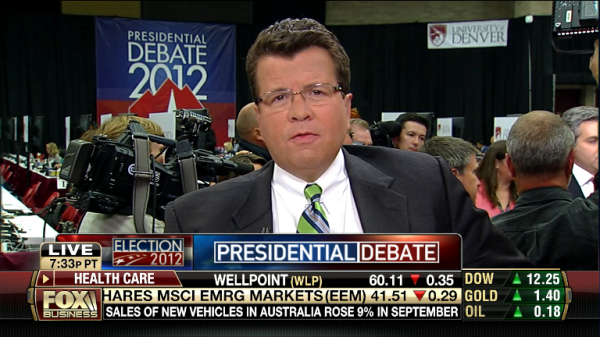
As voters and the media attempt to decipher every speech, debate and poll leading up to Nov. 6, TV anchor and commentator Neil Cavuto says business leaders are focused on the one issue neither candidate has broached: the fiscal cliff.
Through the second debate between President Obama and Republican nominee Mitt Romney, the two campaigns have sparred over how best to spur job creation and boost the middle class, where the future lies for the Affordable Care Act and Dodd-Frank, and whether the Obama administration”™s foreign policy has been tentative or prudent.
What has been conspicuously absent is any discussion over the ramifications of what could amount to a “financial Armageddon,” said Cavuto, senior vice president, anchor, and managing editor of business news for both Fox Business Network and Fox News Channel.
“It”™s just around the holidays that we could be facing holy hell and nobody”™s talking about it,” said Cavuto, who grew up in Danbury and anchors two programs on Fox”™s family of networks: Cavuto, which airs at 8 p.m. on Fox Business Network, and Your World, which airs at 4 p.m. on Fox News Channel.
Cavuto thwarted the notion that business owners and top executives lean to the right, contending instead that they will favor whichever candidate”™s policy proposals would be most beneficial to their respective company.
The problem, he said, is that to date, neither Obama nor Romney has provided a specific framework for how they would address the fiscal cliff represented by the expiration of roughly 40 tax measures and by the sequestration cuts that will affect defense and discretionary spending.
“In the business world, these guys aren”™t red or blue: they”™re green. It”™s about ”˜How can I make money?”™” Cavuto said. “What concerns them the most is the inability of Washington to get their act together. It”™s this fear of the unknown ”“ what regulations are coming, whether taxes are going up.”
Despite recent polls and surveys that suggest an increase in optimism among consumers, behind the scenes and off camera, business leaders are scared, Cavuto said.
“I would worry if my boss isn”™t feeling that great and I think people should as well, because what they seem to be signaling is when they”™re anxious, they”™re not going to expand, they”™re not going to hire more workers,” he said. “So in that environment, I would be very, very worried. I wouldn”™t get more optimistic until these guys are.”
While Romney experienced a significant bump up in national and swing-state polls following the first debate, Cavuto downplayed the outcome, saying that debates initially favor the challenger and that the electoral climate can change rapidly in the final weeks prior to an election.
“History itself is decided by events that no one saw coming,” he said. “I don”™t think anyone could have predicted (before the first debate) that Mitt Romney would come out firing on all cylinders.”
However, he added, “It”™s always the challenger who benefits in these things unless he totally screws up, because so much is expected of the incumbent.”
In the end, he said the onus falls on the candidates to convert voters who favor their opponent.
“This argument that there are very few minds that can be made up because there are so few voters who are undecided … I think there are many more than you would expect, on both sides,” Cavuto said. “What I”™m saying is that whatever the consensus is for the moment, A, it”™s for the moment, and B, it”™s probably wrong.”




















